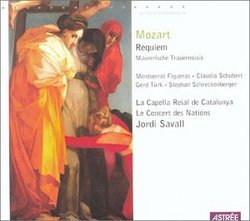| All Artists: Mozart, Savall, Capella Reial Catalunya Title: Requiem Members Wishing: 0 Total Copies: 0 Label: Naive Release Date: 6/12/2001 Album Type: Original recording reissued Genre: Classical Styles: Opera & Classical Vocal, Chamber Music, Historical Periods, Classical (c.1770-1830), Early Music Number of Discs: 1 SwapaCD Credits: 1 UPC: 713746238025 |
Search - Mozart, Savall, Capella Reial Catalunya :: Requiem
 | Mozart, Savall, Capella Reial Catalunya Requiem Genre: Classical
|
Larger Image |
CD Details |
CD ReviewsPrevious reviews are unfair... Robert Taylor | Cambridge, MA United States | 04/11/2004 (5 out of 5 stars) "It's nice to hear the Requiem played in a different manner than the typical mush, which is the result of both an overly-sized orchestra and chorus. Fast is not necessarily wrong. Many other reviewers seem to forget that there are many different editions of the Requiem (this one is undoubtedly Sussmayer), which means that one can either be true to Sussmayer or perhaps be true to what they conceive as Mozart's wishes. Mozart spent the last part of his life writing this piece, mentioning that he may have been writing it more for himself than those who were already dead - therefore, more pathos than normal may be just what this piece needs. Too often have I heard the 'Dies Irae' played in a non-dramatic way...'Day of wrath and doom impending' should be played quickly and fiercely...in other words, in a very buscular way. Another case for the legitimacy of this recording (whether you like it is simply a matter of taste) lies in its being in the key of D minor. Mozart rarely used this key, but when he does the piece should always be 'sturm and drang' (if the K.466 piano concerto isn't evidence of this, then I don't know what is). This is a highly original recording, and certainly worth a listen...whether or not you agree with the slightly unorthodox interpretation." Please....would ignorant reviewers educate themselves...how David Greco | 05/29/2006 (5 out of 5 stars) "This performance is stylistically accurate and more emotionally compelling than so many of the incoherent and 'uninformed' recordings out today. To the reviewer that questioned the 'Adagio' marking...educate yourself please...we are talking about an 18th century Adagio which was more brisk than its romantic counterpart. For the reviewer who has sung this with Barenboim...how nice for you, but his conducting shows little understanding or research on period performance practise.....THE FURTHER THIS MUSIC MOVES AWAY FROM THE BUOYANCY AND FLUIDITY OF DANCE-LIKE MOTION, THE FURTHER IT MOVES AWAY FROM THE COMPOSERS INTENSIONS---NOT IN TERMS OF SPEED BUT ARTICULATION. 17th AND 18th C MUSIC FEEDS OFF THIS RHYTHMIC DRIVE AND ARTICULATION. This is so completely lost in the 19th century approach to earlier music. Stodgy tempi and massed `vibrato hungry' orchestras are the death of this type of music. They ignore the composer's intentions and suffocate any life that was once in the work. The Lacrimosa shouldn't be some wallowing dirge, it should be a sardonic death waltz, spine tingling with that underlying driving rhythmic pulse, not a dreary, indulgent, 'heart on your sleave' approach...makes no sense in relation Mozart's period of composition, style or aesthetic. Think about it!" Requiem brought to life Paul | 06/21/2004 (5 out of 5 stars) "Savall's reading of the familiar Mozart Requiem is a revelation. The music is played with a passion and verve missings from most recordings of this masterpiece. I love reading the negative reviews though, because they typify everything that is wrong about most classical devotees: they treat the music like an unapproachable relic to be polished and revered - not interpreted and lived."
|

 Track Listings (13) - Disc #1
Track Listings (13) - Disc #1